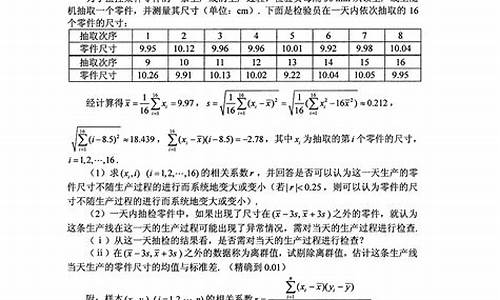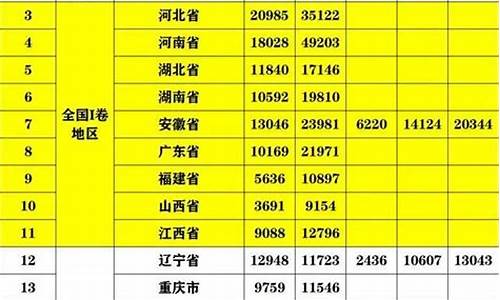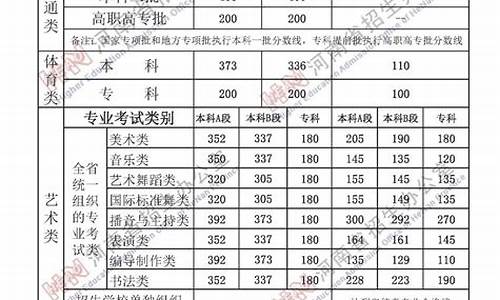您现在的位置是: 首页 > 教育资讯 教育资讯
2017年高考i卷答案_2017年高考卷1
tamoadmin 2024-06-30 人已围观
简介1.2017高考哪些省份使用全国卷I 2017高考哪些省份使用全国卷12.今年高考题作文什么题目3.2017高考语文作文题目都有哪些?4.2017年高考满分作文全国I卷:驼铃深处是清光5.2017年广东高考语文试卷结构 各题型分值是多少分我们都曾愤懑,十八个路人的冷漠将小悦悦推入了死亡的深渊;我们都曾不解,老人及家属将好心的彭宇送上法庭;我们都希望改变,希望路人甲可以更热心一点,别用冷漠的心使生命
1.2017高考哪些省份使用全国卷I 2017高考哪些省份使用全国卷1
2.今年高考题作文什么题目
3.2017高考语文作文题目都有哪些?
4.2017年高考满分作文全国I卷:驼铃深处是清光
5.2017年广东高考语文试卷结构 各题型分值是多少分

我们都曾愤懑,十八个路人的冷漠将小悦悦推入了死亡的深渊;我们都曾不解,老人及家属将好心的彭宇送上法庭;我们都希望改变,希望路人甲可以更热心一点,别用冷漠的心使生命之花一朵朵凋谢;我们都希望改变,希望获助的老人,家属能留下一丝未泯良心,心怀感恩,而不是像农夫怀里的蛇一样反咬别人一口。
我们都期盼改变,希望世界多一丝温暖阳光。
我们都期盼改变,希望世界少一阵冷烈冬风。
可是,当残疾的老人坐在街角在冬风中瑟瑟发抖时,你是否会停下匆匆的脚步,奉献你的爱心;当扒窃的小偷在你眼皮底下拿出了别人的钱包,你是否会大喝一声,将扒手送入警察局;当路边的老人摔倒在地,孤立无援,你是否会伸出援助之手,将他送进医院?
你一定不会!
你会犹豫老人是真的残废需要帮助,还是在装可怜骗取同情,你会犹豫小偷会不会带匕首,伤害到你,向你报复;你会犹豫老人会在苏醒后反咬你一口,说你就是“凶手”……
所以,改变,不能只是希望身边的人改变,而是应该从自己做起,用自己的行动带起周围人的改变。
公交车上别再看着颠簸的老人感到“心疼”,却只是希望别人起身让个座,而自己却坐着丝毫不动,站起来给老人让个座并不难,有了你的改变,身边的人也会跟着改变;马路边,别在看着可怜的乞讨老人漠然走开,伸出你的援助之手,给老人一丝温暖的帮助,也许你身边的人也会因为你的改变而改变,给乞讨老人撑起一片爱的蓝天;别再抱着“事不关己,高高挂起”的心态,无视身边需要帮助的人;别再为了避免“不必要的麻烦”,眼看着生命之话慢慢凋谢……
罗伯特说:“一个人改变了,身边的一些人就可能跟着改变;身边的一些人跟着改变了,很多人可能会跟着改变;很多人改变了,世界就可能改变。”
现在,就让一新一代的我们一起改变,改变自我改变身边的人,改变全世界。让世界多一点温暖,少一点酷寒;让世界多一点欢乐,少一点痛苦;让世界多一点爱,少一点遗憾;让世界多一点阳光雨露,少一点寒霜暴雨。
让我们一起向着太阳奔跑,向着温暖美好的明天奔跑。(m.taiks.com)
2017高考哪些省份使用全国卷I 2017高考哪些省份使用全国卷1
许多在眼前看来天大的事,都不是人生一战,而只是人生一站。确实高考备战让你们很辛苦,可是已经坚持了这么久,这就已经是胜利。祝高考成功!下面是我为大家推荐的河北英语高考题2017年,仅供大家参考!
河北英语高考题2017年第I卷
注意事项:
1.答第I卷前,考生务必将自己的姓名、准考证号填写在答题卡上
2.选出每小题答案后,用2B铅笔把答题卡上对应题目的答案标号涂黑。如需改动,用橡皮擦干净后,再选涂其他答案标号。不能答在本试卷上,否则无效
第一部分听力(共两节,满分30分)
做题时,先将答案标在试卷上,录音内容结束后,你将有两分钟的时间将试卷上的答案转涂到答题卡上
第一节(共5小题;每小题1.5分,满分7.5分)
听下面5段对话。每段对话后有一个小题,从题中所给的A、B、C三个选项中选出最佳选项,并标在试卷的相应位置。听完每段对话后,你都有10秒钟的时间来回答有关小题和阅读下一小题题。每段对话仅读一遍。
例:How much is the shirt?
A.£19.15. B.£9.18. C.£9.15.
答案是C。
1. Where is Mary?
A. In the classroom. B. In the library. C. On the playground.
2. How much should the man pay for the tickets?
A. $16. B. $12. C. $6
3. Why can?t the woman give the man some help?
A. She is quite busy now.
B. She doesn?t like grammar.
C. She is poor in grammar,too.
4. What happened to Marx?
A. He lost his way.
B. He found his bike missing.
C. He lost his wallet.
5. Why did the man fail to attend the party?
A. He forgot it.
B. He didn?t know about the party.
C. He wasn?t invited to the party.
第二节(共15小题;每小题1.5分,满分22.5分)
听下面5段对话或独白。每段对话或独白后有几个小题,从题中所给的A、B、C三个选项中选出最佳选项,并标在试卷的相应位置。听每段对话或独白前,你将有时间阅读各个小题,每小题5秒钟;听完后,各小题将给出5秒钟的作答时间。每段对话或独白读两遍。
听第6段材料,回答第6、7题。
6. Why must the man drive to work?
A. It is the quickest way.
B. He has to use his car after work.
C. He lives too far from the subway.
7. What?s the relationship between the speakers?
A. Boss and employee.
B. Grandmother and grandson.
C. Teacher and student.
听第7段材料,回答第8~9题。
8. When is Alice?s birthday?
A. Tomorrow. B. The day after tomorrow. C. Today.
9. What will the two speakers buy for Alice?
A. A recorder. B. Some flowers. C. A box of chocolates.
听第8段材料,回答第10~12题。
10. What does the woman do in the group?
A. Play the piano. B. Play the violin. C. Sing for the group.
11. Who is Miss Pearson?
A. Leader of the group.B. Director of the group. C. Teacher of the group.
12. How often does the group meet?
A. Once a week. B. Twice a week. C. Every third week.
听第9段材料,回答第13~16题。
13. Who possibly is the woman?
A. An air hostess. B. A native Indian. C. A travel agent.
14. How long does the trip last?
A. Seven days. B. Eight days. C. Nine days.
15. What will the man probably do at the second stage?
A. Do some shopping. B. Visit the Taj Mabal. C. See wild animals.
16. What will the speakers do next?
A. Say goodbye to each other.B. Find out the price. C. Go to India by air.
听第10段材料,回答第17~20题。
17. In what way does Jack like to travel?
A. With a lot of people.
B. With one or two good friends.
C. All by himself.
18. What does Helen prefer on holiday?
A. Staying at home.
B. Seeing famous places.
C. Enjoying nature quietly.
19. What does Bob like the best about travel?
A. Making more friends. B. Buying what he wants. C. Seeing and learning.
20. Who prefers to do shopping while traveling?
A. Jack. B. Helen. C. Bob.
第二部分阅读理解(共两节,满分40分)
第一节(共15小题;每小题2分,满分30分)
阅读下列短文,从每题所给的四个选项(A、B、C和D)中,选出最佳选项,并在答题卡上将该项涂黑。
A
We have designed all our bank cards to make your life easier.
Using your NatWest Service Card
As a Switch card, it lets you pay for all sorts of goods and services, whenever you see the Switch logo. The money comes straight out of your account, so you can spend as much as you like as long as you have enough money (or an agreed overdraft (透支) to cover it). It is also a cheque guarantee card for up to the amount shown on the card. And it gives you free access to your money from over 31,000 cash machines across the UK.
Using your NatWest Cash Card
You can use your Cash Card as a Solo card to pay for goods and services wherever you see the Solo logo. It can also give you access to your account and your cash from over 31,000 cash machines nationwide. You can spend or withdraw what you have in your account, or as much as your agreed overdraft limit.
Using your cards abroad
You can also use your Service Card and Cash Card when you?re abroad. You can withdraw cash at cash machines and pay for goods and services wherever you see the Cirrus or Maestro logo displayed.
We take a commission charge (手续费) of 2.25% of each cash withdrawal you make (up to£4) and a commission charge of 75 pence every time you use Maestro to pay for goods or services. We also apply a foreign-exchange transaction fee of 2.65%.
Using your NatWest Credit Card
With your credit card you can do the following:
* Pay for goods and services and enjoy up to 56 days? interest-free credit.
* Pay in over 24 million shops worldwide that display the MasterCard or Visa logos.
* Collect one AIR MILE for every£20 of spending that appears on your statement (结算单). (This does not include foreign currency or traveler?s cheques bought, interest and other charges.)
21. If you carry the Service Card or the Cash Card, ________.
A. you can use it to guarantee things as you wish
B. you can draw your money from cash machines conveniently
C. you can spend as much money as you like without a limit
D. you have to pay some extra money when you pay for services in the UK
22. If you withdraw£200 from a cash machine abroad, you will be charged ________.
A. £4 B. £4.5 C. £5.25 D. £5.3
23. Which of the following is TRUE about using your NatWest Credit Card?
A. You have to pay back with interest within 56 days.
B. You can use the card in any shop across the world.
C. You will be charged some interest beyond two months.
D. You will gain one air mile if you spend £20 on traveller?s cheques.
24. The purpose of the passage is to show you how to ________.
A. pay for goods with your cards B. use your cards abroad
C. draw cash with your cards D. play your cards right
B
Once when I was facing a decision that involved high risk, I went to a friend. He looked at me for a moment, and then wrote a sentence containing the best advice I?ve ever had: Be bold and brave ? and mighty (强大的) forces will come to your aid.
Those words made me see clearly that when I had fallen short in the past, it was seldom because I had tried and failed. It was usually because I had let fear of failure stop me from trying at all. On the other hand, whenever I had plunged into deep water, forced by courage or circumstance, I had always been able to swim until I got my feet on the ground again.
Boldness means a decision to bite off more than you can eat. And there is nothing mysterious about the mighty forces. They are potential powers we possess: energy, skill, sound judgment, creative ideas ? even physical strength greater than most of us realize.
Admittedly, those mighty forces are spiritual ones. But they are more important than physical ones. A college classmate of mine, Tim, was an excellent football player, even though he weighed much less than the average player. ?In one game I suddenly found myself confronting a huge player, who had nothing but me between him and our goal line,? said Tim. ?I was so frightened that I closed my eyes and desperately threw myself at that guy like a bullet ? and stopped him cold.?
Boldness ? a willingness to extend yourself to the extreme?is not one that can be acquired overnight. But it can be taught to children and developed in adults. Confidence builds up. Surely, there will be setbacks (挫折) and disappointments in life; boldness in itself is no guarantee of success. But the person who tries to do something and fails is a lot better off than the person who tries to do nothing and succeeds.
So, always try to live a little bit beyond your abilities?and you?ll find your abilities are greater than you ever dreamed.
25. Why was the author sometimes unable to reach his goal in the past?
A. He faced huge risks. B. He lacked mighty forces.
C. Fear prevented him from trying. D. Failure blocked his way to success.
26. What is the implied meaning of the underlined part?
A. Swallow more than you can digest. B. Act slightly above your abilities.
C. Develop more mysterious powers. D. Learn to make creative decisions.
27. What can be learned from Paragraph 5?
A. Confidence grows more rapidly in adults. B. Trying without success is meaningless.
C. Repeated failure creates a better life. D. Boldness can be gained little by little.
C
The wallet is heading for extinction. As a day-to-day essential, it will die off with the generation who read print newspapers. The kind of shopping-where you hand over notes and count out change in return?now happens only in the most minor of our retail encounters,like buying a bar of chocolate or a pint of milk from a corner shop. At the shops where you spend any real money, that money is increasingly abstracted. And this is more and more true, the higher up the scale you go. At the most cutting-edge retail stores?Victoria Beckham on Dover Street, for instance?you don't go and stand at any kind of cash register when you decide to pay. The staff are equipped with iPads to take your payment while you relax on a sofa.
Which is nothing more or less than excellent service, if you have the money. But across society, the abstraction(抽象) of the idea of cash makes me uneasy. Maybe I'm just old-fashioned. But earning money isn't quick or easy for most of us. Isn't it a bit incredible that spending it should happen in half a blink(眨眼)of an eye? Doesn't a wallet?that time-honoured Friday-night feeling of pleasing, promising fatness?represent something that matters?
But I'll leave the economics to the experts. What bothers me about the death of the wallet is the change it represents in our physical environment. Everything about the look and feel of a wallet?the way the fastenings and materials wear and tear and loosen with age, the plastic and paper and gold and silver, and handwritten phone numbers and printed cinema tickets?is the very opposite of what our world is becoming. The opposite of a wallet is a smartphone or an iPad. The rounded edges, cool glass, smooth and unknowable as pebble(鹅卵石). Instead of digging through pieces of paper and peering into corners, we move our fingers left and right. No more counting out coins. Show your wallet, if you still have one. It may not be here much longer.
28. What is happening to the wallet?
A. It is disappearing. B. It is being fattened.
C. It is becoming costly. D. It is changing in style.
29. What makes the author feel uncomfortable nowadays?
A. Saving money is becoming a thing of the past.
B. The pleasing Friday-night feeling is fading.
C. Earning money is getting more difficult.
D. Spending money is so fast and easy.
30. Why does the author choose to write about what's happening to the wallet?
A. It represents a change in the modern world.
B. It has something to do with everybody's life.
C. It marks the end of a time-honoured tradition.
D. It is the concern of contemporary economists.
31. What can we infer from the passage about the author?
A. He is resistant to social changes.
B. He is against technological progress.
C. He feels reluctant to part with the traditional wallet.
D. He feels insecure in the ever-changing modern world.
今年高考题作文什么题目
2017年高考使用全国Ⅰ卷的省份:
福建、河南、河北、山西、江西、湖北、湖南、广东、安徽。
山东省部分科目使用全国Ⅰ卷:
全国Ⅰ卷;外语、文综、理综, 自主命题:语文、文数、理数。
扩展资料:
(新课标Ⅱ卷)
2015年及其之前:贵州 甘肃 广西 青海 西藏 黑龙江 吉林 宁夏 内蒙古 新疆 云南 辽宁(综合)海南(语文 数学 英语)。
2015年增加省份:辽宁 (语文 数学 英语)。
2016年增加省份:陕西、重庆、;取消省份:广西 云南 贵州。
2018年使用省区:甘肃、青海、黑龙江、吉林、辽宁、宁夏、新疆、内蒙古、陕西、重庆、海南(语文、数学、英语)西藏2018使用的是全国三卷。
参考资料:高考试题全国卷_百度百科
2017高考语文作文题目都有哪些?
一·2017年高考全国卷I作文:老外眼中的中国关键词。
据近期一项对来华留学生的调查,他们较为关注的“中国关键词”有:一带一路、大熊猫、广场舞、中华美食、长城、共享单车、京剧、空气污染、美丽乡村、食品安全、高铁、移动支付。
请从中选择两三个关键词来呈现你所认识的中国,写一篇文章帮助外国青年读懂中国。要求选好关键词,使之形成有机的关联;选好角度,明确文体,自拟标题;不要套作,不得抄袭,不少于800字。
二·2017年高考全国卷II作文:根据诗句自拟文。
阅读下面的材料,根据要求写作。
1、天行健,君子以自强不息《周易》
2、露从今夜白,月是故乡明(杜甫)
3、何须浅碧深红色,自是花中第一流(李清照)
4、受光于庭户见一堂,受光于天下照四方(魏源)
5、必须敢于正视,这才可望,敢想,敢说,敢做,敢当(鲁迅)
6、数风流人物,还看今朝(毛泽东)
中国文化博大精深,无数名句化育后世。读了上面六句,你有怎样的感触与思考?请以其中两三句为基础确认立意,并合理引用。写一篇文章,要求自选角度,明确文体,自拟标题;不少于800字。
三·2017年高考全国卷III作文:我与高考或我看高考。
2017年高考语文考试已经结束,以下为2017年全国卷III高考作文题:(适用地区:四川 广西 贵州 云南)
今年是我国恢复高考40周年,高考为国选材,推动了教育改革与社会进步,取得了举世瞩目的成就,40年来,高考激扬梦想,凝聚着几代青年的集体记忆与个人情感,饱含着无数家庭的泪珠汗水与笑语欢声,想当年,1977的高考标志着一个时代的拐点。看今天,你正与全国千万考生一起奋战在2017的高考考场上。
要求:请以“我看高考”或“我的高考”为副标题,写一篇文章。要求选好角度,确定立意,明确文体,自拟标题且不少于800字。
2017年高考满分作文全国I卷:驼铃深处是清光
2017年6月7日一年一度的高考又如期而至,今天上午刚刚结束了语文考试,很多人都好奇今年出的是什么作文,下面我们来看看各地作文题目:
北京卷:
二选一
纽带是能够起联系作用的人或事。人心需要纽带凝聚,力量需要纽带汇集。当今时代,经济全球化的发展、文化的发展、历史的传承、社会的安宁、校园的和谐都需要纽带。请以“说纽带”为题,写一篇议论文。要求:观点明确,论据充分,论证合理。
2. 2049年,我们的共和国将迎来百年华诞。届时假如请你拍摄一幅或几幅照片来显现中华民族伟大复兴的辉煌成就,你将选择怎样的画面?请展开想象,以“共和国,我为你拍照”为题,写一篇记叙文。要求:想象合理,有叙述,有描写,可以写宏大的画面,也可以写小的场景,以小见大。
山东卷
一个24小时的共享书店营业,白领、流浪汉等各种各样的人都在里面读书,有的就只是简单的翻几页书。以此为材料,进行作文。
江苏卷
材料作文:生活中离不开车。车,种类繁多,形态各异。车来车往,见证着时代的发展,承载了世间的真情;车来车往,折射出观念的变迁,蕴含着人生的哲理。
上海卷
预测,是指预先推测。生活充满变数,有的人乐于接受对生活的预测,有的人则不以为然。请写一篇文章谈谈你的思考。
浙江卷
有位作家说,人要读三本大书,一本是“有字之书”,一本是“无字之书”,一本“心灵之书”,对此你有怎样的思考?请对作家的观点加以评说。
天津卷
我们在长辈的环绕下成长,自以为了解他们,其实每一位长辈都是一部厚书,一旦重新打开,就会读到人生的事理,读到传统的积淀,读到时代的印记,还可以读出我们自己,读出我们成长时他们的成长与成熟,读出我们和他们之间认知上的共识或分歧……
十八岁的我们已经长大,今天的重读,是成年个体之间平等的心灵对话、灵魂触摸,是通往理性认知的幽径。请结合自己的生活阅历深入思考,围绕“重读长辈这部书”写一篇作文。
全国卷I(河南、河北、山西、江西、湖北、湖南、广东、安徽、福建)
据近期一项对来华留学生的调查,他们较为关注的中国关键词有:一带一路,大熊猫,广场舞,中华美食,长城,共享单车,京剧,空气污染,美丽乡村,食品安全,高铁,移动支付。
请选择两三个关键词来呈现你所认识的中国,写一篇文章帮助外国青年读懂中国。
全国卷II(甘肃、青海、内蒙古、黑龙江、吉林、辽宁、宁夏、新疆、西藏、陕西、重庆、海南)从所给出的6个古诗句选2个或者3个,自行立意,确定文体,自拟题目。
1.天行健,君子以自强不息。《周易》
2.露从今夜白,月是故乡明。(杜甫)
3.何须浅碧深红色,自是花中第一流。(李清照)
4.受光于庭户见一堂,受光于天下照四方。(魏源)
5.必须敢于正视,这才可望,敢想,敢说,敢做,敢当。(鲁迅)
6.数风流人物,还看今朝。(毛泽东)
全国卷III(云南、广西、贵州、四川)
今年是我国恢复高考40周年,40年来,高考为国选材,推动了教育改革与社会进步,取得了举世瞩目的成就。40年来,高考激扬梦想,凝聚着几代青年的集体记忆与个人情感,饱含着无数家庭的泪珠汗水与笑语欢声。想当年,1977的高考标志着一个时代的拐点;看今天,你正与全国千万考生一起,奋战在2017的高考考场上……
2017年广东高考语文试卷结构 各题型分值是多少分
牧野飘飞的秋季,竹马铜铃从幽谷深处泠泠而来。马策云奔,暮日金空,十里银波,苇絮踏风散落。
李家大院坐落在山原旷野中,别家小屋都依山而建,独此一家大户,横立沃土中央,众星斗拱,晚风一来,周围稻浪飘香,宁静中平添几分肃穆。
历史上徽商名满天下。李家世代经商,更是徽商中的佼佼者。这样的大户人家并不盛行贴金熨银的庸俗风气,倒是节俭得很。宅院石墙青瓦,院内素竹幽兰,菊香满堂,柜盏上翠蓝的冰裂青瓷盈盈泛着淡光,木雕镂空的檀木牌匾上,赫然刻着祖训,女当勤务耕织,相夫教子;男当习文识书,敏讷忠信。书香满庭,恪守规矩的家风代代相传,历久弥新。
李恪祖和李恪新是李家的两个宝贝孙子。李家老爷费尽心力请来当地最有名气的吴秀才,教授兄弟俩知书达理。李恪祖很有兄长样,老实忠厚,寡语少言,尊重祖训师道,四书五经倒背如流;李恪新则似天生长有反骨:经书倒是也能过目不忘,出口成章,只是凡事非要问个“子丑寅卯”,对待老先生也不像兄长毕恭毕敬,对待四书五经的翻译喜欢和老先生探究探究,有时干脆自己修改某些语句,加些脚注,亦或是另起炉灶,自己创作“新篇”。吴先生常常恼怒李家二公子,也懒得和一个毛孩子一般见识,只随时拿起李家老爷赐予的“尚方宝剑”——一把特别结实的戒尺“伺候”他,可笑那李恪新任凭戒尺过处道道血痕,还若无其事地口中喃喃:我有我自己的想法……
吴秀才终于忍受不得,回家了。李家大院传开了这件事,说是新二爷逼走了老先生,大逆不道;大少爷沉稳厚重,温文尔雅,将来必成大器光宗耀祖。
**战争的大炮打开了中国经济的大门,也把李家的两个少爷带到了城里的“洋学堂”。
五彩艳丽的旗袍,简约英挺的中山装,一头卷发讲一口流利的英文的老师们,上衣口袋插着笔的意气风发的青年学生,从未见过的大稀罕物黑壳汽车,在夜晚快速跳动的艳丽的霓虹灯,带给两个少年完全不同以往的感受和向往。
大哥李恪祖,少年老成,谨记祖宗教诲,门门功课了得。尤其写得一手好文章。引经据典,详略得当,铺陈排比,气势磅礴,用词老练精准,起承转合婉转动情,文采斐然。
时过境迁,当年手握笔杆的少年都已长成谦谦公子,温润如玉。老大依母之言,继承了做箱包的祖业。老二依旧固执,死活不肯继承家业,依旧漂泊闯荡,自行创业。
父母逼迫老二恪新迎娶娃娃亲,在新娘子凤袍霞帔鸳鸯袄,银钗金钿珍珠屏的大喜之日,他身骑白马,一身红裳踏着七彩祥云而来,在他身前,拥着一个金发碧眼的异域女子。他朗声道:“这门亲事,于你于我,都无益,何必苦苦相逼,委屈强求。这是我唯一的心上人,非此不娶。”话音刚落,他便提鞭策马,扬长而去。众宾客一阵唏嘘,李家老母当场气晕过去。从此,李家的族谱上再也没出现过李恪新这个名字,红尘莽莽,再不见少年孤傲的身影。
“李总,我们的股份骤然下跌,每一家旗舰店都数月不曾卖出一件商品。”
这个噩耗骤然劈向李恪祖,他守着祖上的秘方,采江南最湿柔的滕竹,小火微醺,再用最传统的工艺编制,箱包的每一道工序,都没有差错。往年生意一直顺风顺水,但近来另一家箱包黑马的杀出,令他的企业几乎陷入绝境。
原来,在多年的考察中,那位黑马箱包商发现了箱包市场的商机。他一改往日箱包极大极小的弊端主攻中型箱包市场,废掉传统用简单的棉麻丝纺织而成的布袋,滕竹木板编制的方正皮箱,也放弃沿用尼龙裁就粗制滥造的工艺,选用从越南进口的高级ABS原料,做了一款两面可用的手提包。一面充满民族风情,青蓝翠布上是传统扎染混和现代印染的纳西族的碎白印花,大胆泼印西双版纳蓝紫色的暮霭图腾,使画面呈现清丽跳跃的撞色,另一面是纯黑雅致,防水耐潮的商务兼旅行型多功能手提包,采用先进纳米技术,结合军用包多种性能,结实耐用。手柄处挂一个古铜色的银盘丝扣的精巧的铜铃,给提包添了份灵气,它带着徽商商队在历史的漫漫黄沙中蔓延而来的悠远,它带着精工细作的祖传手艺以及改造后独有的大气,带着它身后的岁月呼啸而来,为这款作品的诞生圆一个点睛之笔。
相比朴素易潮,笨重易磨的传统箱包,这款提包的出现无疑是一道烟火,划破了传统的沉寂,迅速席卷全球,让仍处于新旧交替中混沌的人们骤然觉醒,最富深意的铜铃,因此也成了象征李氏产品的标志。
没错,这位徽商正是李氏二子,李恪新。
当李恪新在高大的落地窗前俯瞰满城夜景,细细品茗构思时,助手传来消息,哥哥的公司长期负盈亏空,即将倒闭。生活经不起考量,谨思慎行的哥哥被众人看好,却深陷泥潭,特立独行,敢于创新的弟弟笔走偏锋,虽险,却也赢得了人生。
他从来没有忘记祖训,雅致经典的提包上,每一寸都体现了他对祖传手艺的摸索与创新,他的不羁,他的隐退,只是希望自家的招牌能在市场沉浮中打拼出一片新天地。他收购了哥哥的公司,恪祖幡然醒悟,两人联手创业,成为箱包市场上的神话。
不知过了多少年,他老了,知道自己该休息了。有一天,他坐在洒满月光的院子里,他的目光停留在孙子手上那个古铜色的铃铛上,淡淡的眸子亮了一下,看见他小小的孙儿拿着一个古铜色的铃铛,铃铛不断打磨改造变得愈发经旧,月光反射在铜铃上的清光像老人毕生的信仰,印在孙儿惊奇的眸子里。
那么明亮,那么,明亮……(m.taiks.com)
第I卷 阅读题
甲 必考题
一、现代文阅读(9分,每小题3分)
1~3 单选题
二、古代诗文阅读(36分)
(一)文言文阅读(19分)
4~6单选题,每小题3分
7题,文言文翻译,10分
(二)古代诗歌阅读(11分)
8题,6分
9题,5分
(三)名篇名句默写(6分)
10题,6分
乙 选考题(三、四大题选一个做)
三、文学类文本阅读(25分)
11题,(1)双选题,5分;(2)(3)分析题,6分;(4)分析题,8分
四、实用类文本阅读(25分)
12题,(1)双选题,5分;(2)(3)分析题,6分;(4)分析题,8分
第II卷 表达题
五、语言文字运用(20分)
13~15单选题,每小题3分
16题,5分
17题,6分
六、写作(60分)
18题,60分









